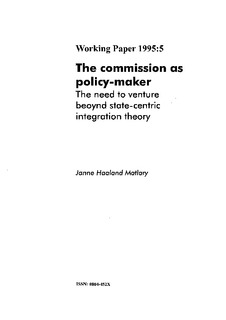| dc.contributor.author | Matlary, Janne Haaland | nb_NO |
| dc.date.accessioned | 2014-03-17T14:31:08Z | |
| dc.date.available | 2014-03-17T14:31:08Z | |
| dc.date.issued | 1995 | nb_NO |
| dc.identifier.issn | 0504-452X | nb_NO |
| dc.identifier.uri | http://hdl.handle.net/11250/192190 | |
| dc.description.abstract | This article criticizes Andrew Moravcsik´s model of two-level states-EU interaction on three counts: it neglects EU actors, assumes the primacy of state actors, and further assumes that interests are formed prior to policy interaction at the EU-level. Empirical evidence of especially the Commission's role in the post-85 period is examined to show the independent actor role of the former. This forms the basis for the subsequent theoretical discussion of the role of non-state actors. The author argues the need for a multi-level model of integration and for a decomposition of the policy-process into the agenda-setting and the negotiation phases. She calls for a processual rather than actor-specific starting point since empirical events have obliterated the assumption of a domestic-international divide and thereby also of the primacy of the state as actor. | nb_NO |
| dc.language.iso | eng | nb_NO |
| dc.publisher | CICERO Center for International Climate and Environmental Research - Oslo | nb_NO |
| dc.relation.ispartof | CICERO Working Paper | nb_NO |
| dc.relation.ispartofseries | CICERO Working Paper;1995:05 | nb_NO |
| dc.title | The Commission as policy-maker: The need to venture beyond state-centric integration theory | nb_NO |
| dc.type | Working paper | nb_NO |
| dc.source.pagenumber | | nb_NO |
